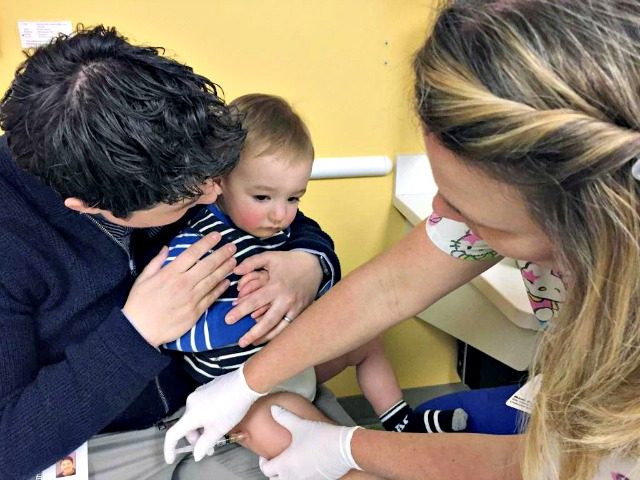The Minnesota Department of Health (MDH) announced on Friday afternoon that the number of confirmed cases of measles in the state has now increased to 44, three more than had been confirmed 24 hours ago, and ten more than had been confirmed 48 hours ago.
Of the 44 total cases, 41 are in Hennepin County, two are in Ramsey County, and one is in Crow Wing County.
Forty-two are “confirmed to be unvaccinated.” Two “had 2 doses of MMR.”
Forty-three of the cases are “in children ages 0 through 10 years,” while there is “1 case in an adult.”
MDH reports that “38 of the cases are Somali Minnesotan.”
“Health officials said the Crow Wing county child may have been exposed in multiple locations in Hennepin County,” MDH said in a statement released on Thursday.
“Once measles begins to spread in unvaccinated populations, it can be very difficult to stop,” Kris Ehresmann, director of infectious disease control for MDH, said in the statement.
“We would not be surprised if we saw additional cases in other parts of the state where there are clusters of unvaccinated people before this is over,” Ehresmann added.
In Thursday’s statement, MDH added new information about the investigation it has been conducting into the outbreak. According to the MDH statement:
Disease investigators follow up with each confirmed case to determine how the person became infected and who was exposed to the case while they were infectious. Those exposed people who are determined not to be immune to measles – because they have not been vaccinated nor had the disease – are asked to exclude themselves from school, work or child care for 21 days.
“In addition to case identification, investigation and follow-up, state and local health officials have been working with local public health staff and leaders in the Somali community to address concerns about autism and encourage MMR vaccination,” the statement added.
The measles outbreak, now the largest in the state in more than 20 years, is becoming costly to the taxpayers of Minnesota. The MDH statement noted:
In the three weeks since the outbreak began, outbreak response efforts have involved more than 70 staff at the state level, working full or part time, at a cost of $207,000. In addition, county public health staff and health care providers and facilities involved in the outbreak have accrued significant labor and related costs.
The first case of measles in Minnesota in 2017 was diagnosed on April 11, but MDH did not report the first three cases publicly until April 13.
“Most of the exposures have occurred in either child care, health care or household settings. To date, more than 2,500 people have been exposed,” MDH said on Thursday.
Early on in the outbreak, Ehresmann noted that “measles can spread easily among unvaccinated people.”
“The best way to protect yourself and your community is to make sure everyone has been vaccinated,” she said at the time.
“Measles was declared eliminated in the U.S. in 2000, but it is still common in other parts of the world. Ehresmann noted that Europe is currently experiencing a significant measles outbreak. Minnesota and other states still see sporadic cases – typically linked to international travel,” MDH said in a statement released on April 14, one day after the first three cases were reported:
Most people in Minnesota are immune to measles either from having been vaccinated or from having had the disease. However, in recent years immunization rates have declined in some communities and groups – often due to fears related to misinformation about vaccine risks. This decline in immunization rates increases the risk – not only for those who are unvaccinated by choice, but also for those who cannot be vaccinated due to health status or age. Minnesota’s Somali community in particular has struggled with low rates of immunization due in part to misinformation about immunization risks.
“This outbreak is about unvaccinated children, not specific communities,” said Minnesota Health Commissioner Dr. Ed Ehlinger. “Unfortunately, the Minnesota Somali community has been targeted with misinformation about vaccine risks. We’re partnering with Somali community leaders and health care providers to counteract that misinformation. We want as many Minnesotans as possible to protect themselves and their families by getting vaccinated.”
“We’re working with the Somali community in the Twin Cities to alert people to the outbreak,” Ehresmann added in the April 14 statement.

COMMENTS
Please let us know if you're having issues with commenting.